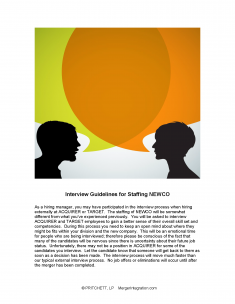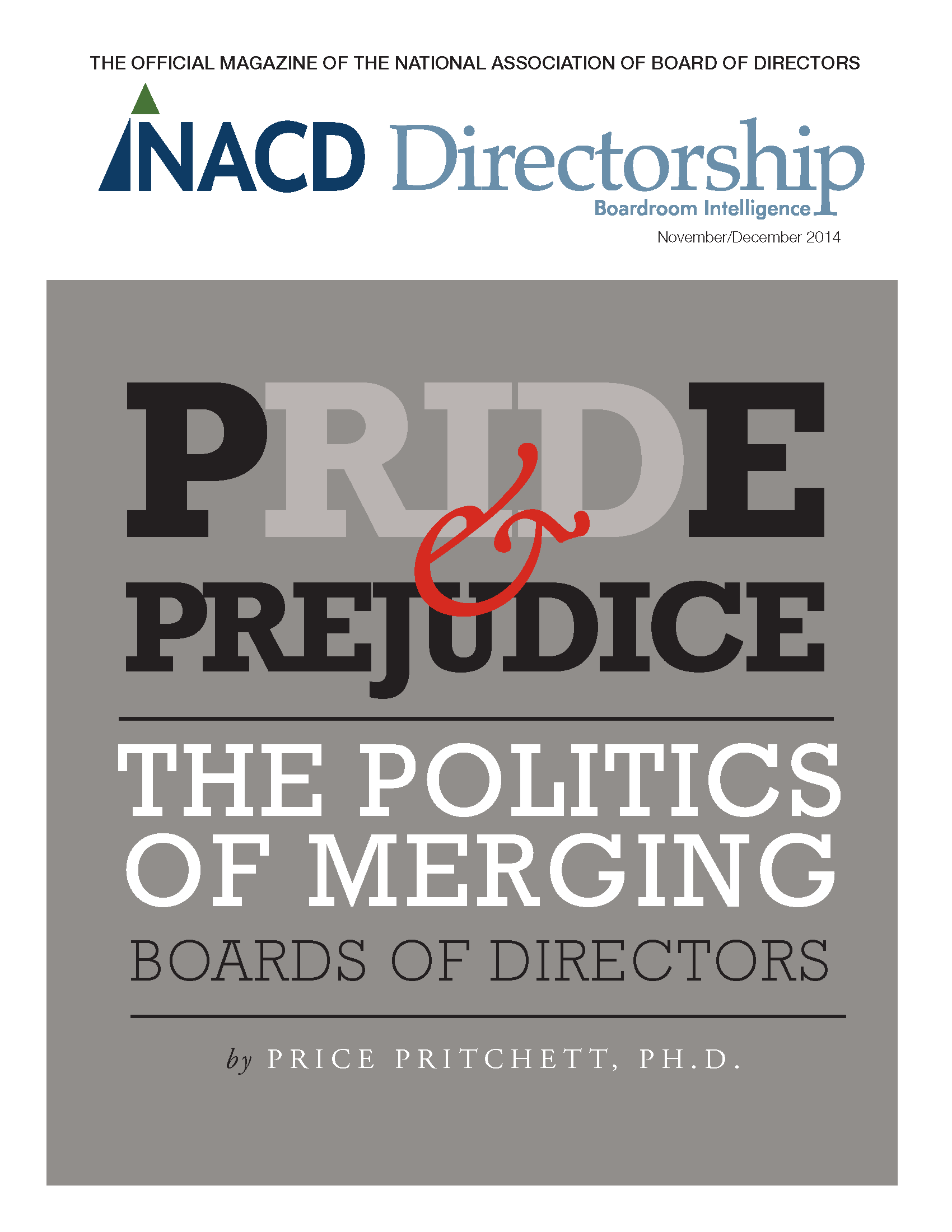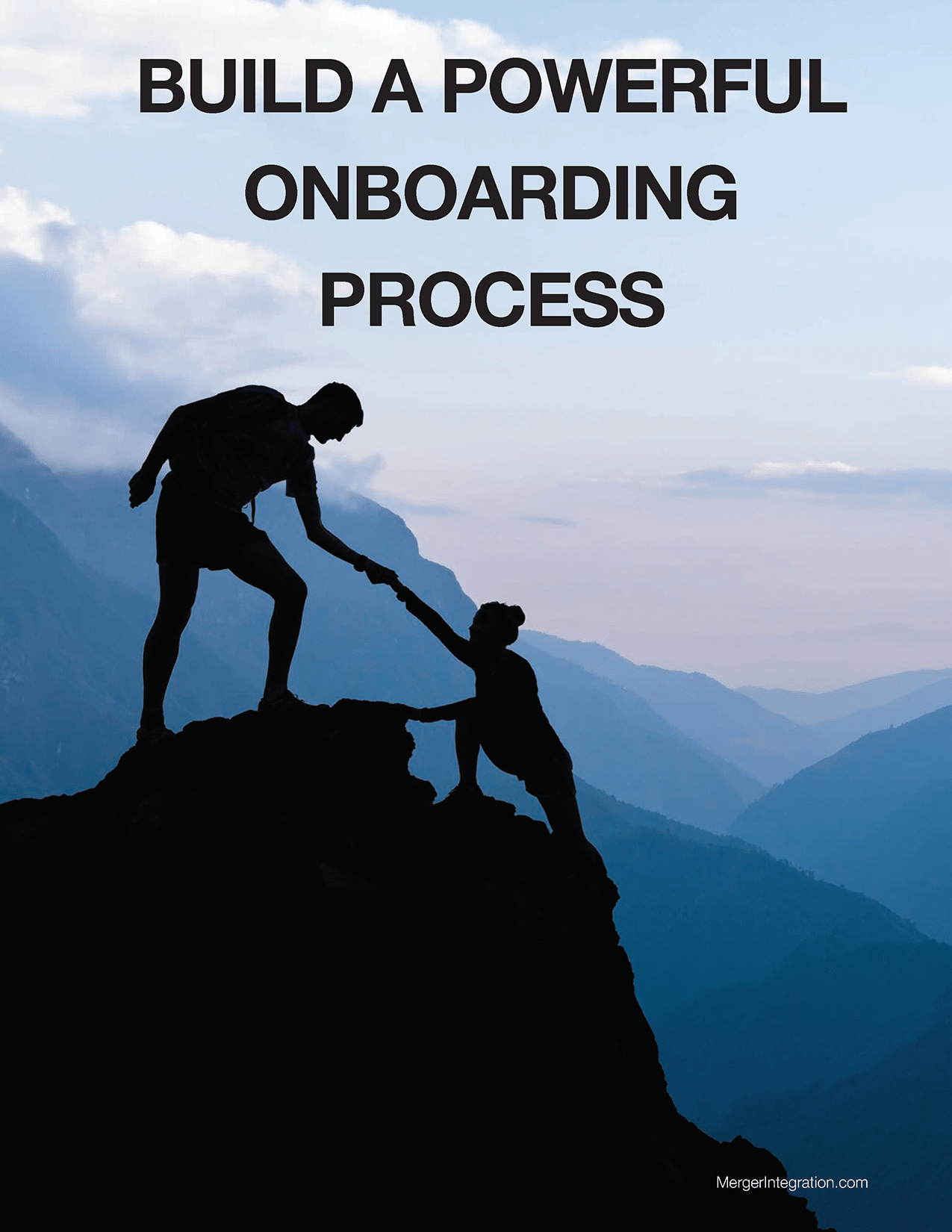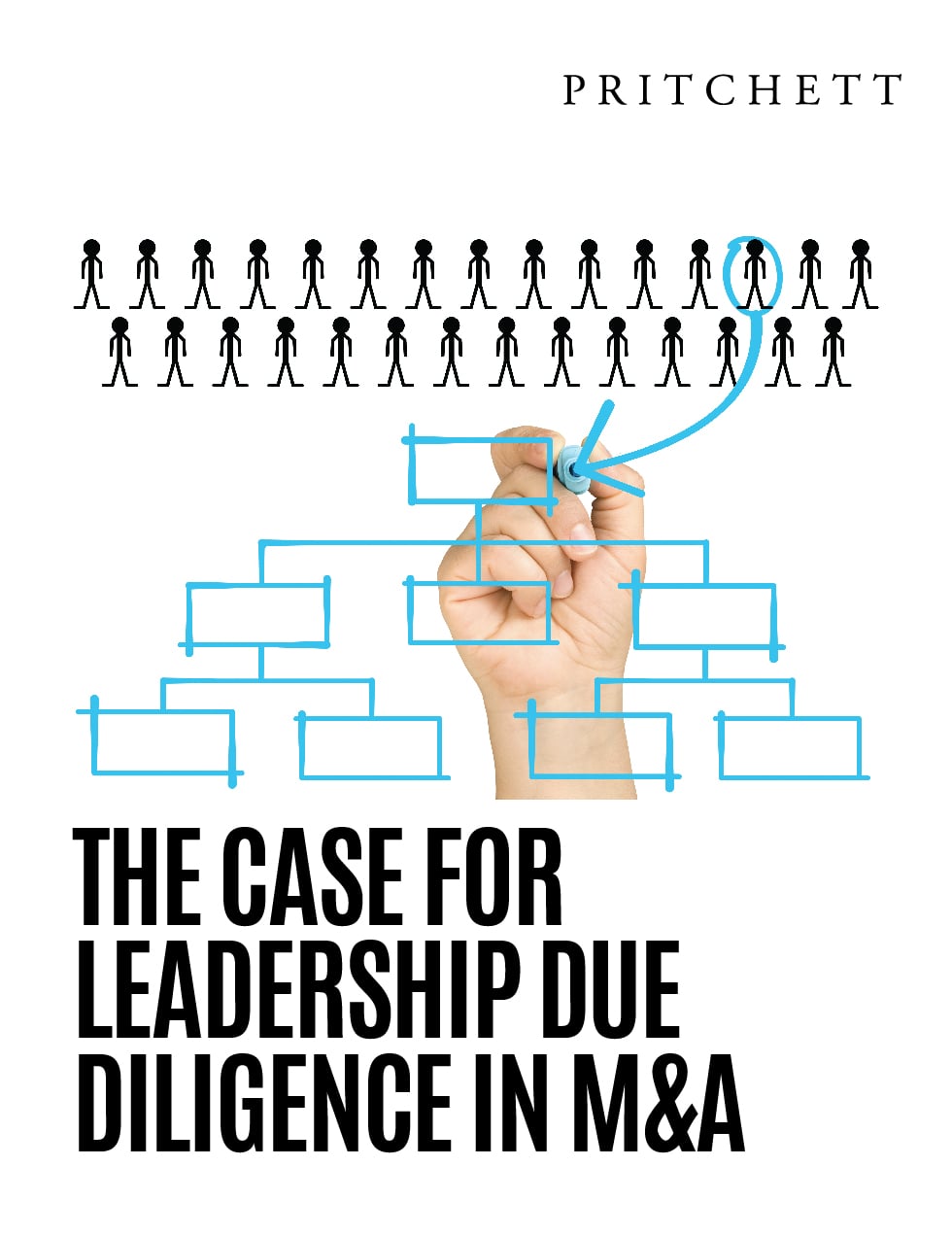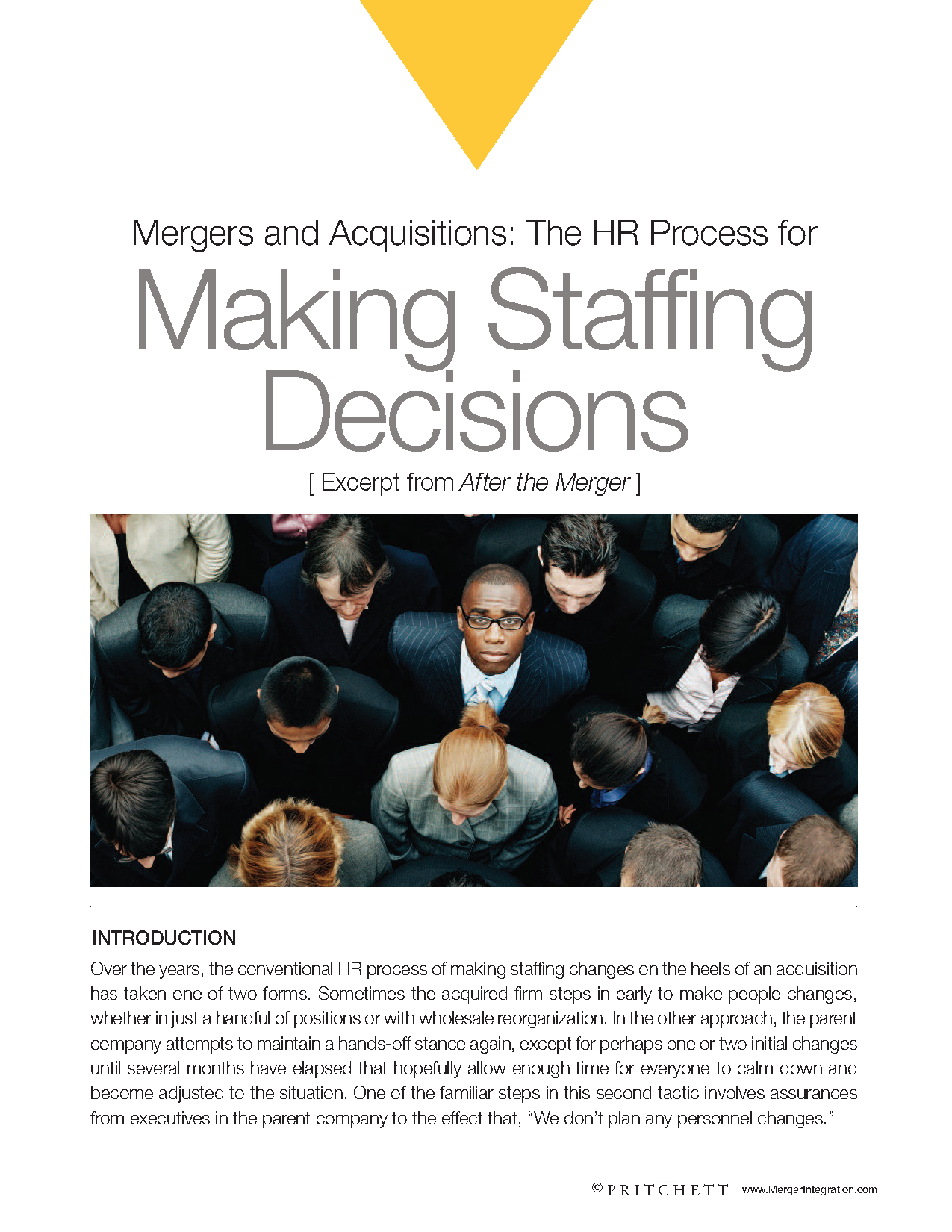As a hiring manager, you may have participated in the interview process when hiring externally at ACQUIRER or TARGET. The staffing of NEWCO will be somewhat different from what you’ve experienced previously. You will be asked to interview ACQUIRER and TARGET employees to gain a better sense of their overall skill set and competencies. During this process you need to keep an open mind about where they might be fits within your division and the new company. This will be an emotional time for people who are being interviewed; therefore please be conscious of the fact that many of the candidates will be nervous since there is uncertainty about their future job status. Unfortunately, there may not be a position in ACQUIRER for some of the candidates you interview. Let the candidate know that someone will get back to them as soon as a decision has been made. The interview process will move much faster than our typical external interview process. No job offers or eliminations will occur until after the merger has been completed.
How to Find the Best Person for Your Job
Step 1: Defining and Communicating Your Hiring Need
For positions in the new organization, hiring managers will need to create a job description that describes the position’s purpose, key responsibilities, and required skill sets.
Consider the following:
-
Set realistic job expectations. The goal is to provide enough information about the position for potential candidates to accurately assess their qualifications and interest in the position.
-
Think about what skills the candidate will be required to have on his/her 1st day on the job. Initially focus on job specifications by noting which experiences/skills are essential, which are “nice to have,” and which can be learned once the new employee is in the job.
-
Focus on an objective description, NOT personal qualities or traits. Skills, abilities, and behaviors are appropriate to include in a job description. On the other hand, a personal quality or trait (i.e., easy to get along with) is a subjective description and therefore, is not appropriate to include in the job description.
Please note that once the job description is complete, the appropriate pay range for the job must be determined. Please contact the HR Department to assist you with creating a description for your opening along with determining the correct salary. If a situation arises where a new job needs to be evaluated by the compensation group for pricing the salary range, please ensure you provide enough detail about the job to ensure the compensation group has adequate information for their evaluation process.
In some cases, you may be asked to conduct an exploratory interview with the candidate. In this case, you should let the candidate know you are going to ask general questions to get a better sense of their overall skill set and take the time to discuss your department or teams responsibilities. Keep an open mind about where they might be a fit.
Step 2: Establish your priorities
As you think about the requirements of the position, take the time to categorize your requirements according to critical ("must haves") and desirable ("want/nice to haves").
"Critical" requirements are those you absolutely must have--those critical factors that a candidate does not possess will eliminate that candidate from consideration for your position. "Desirable" requirements, secondary selection criteria, are attributes you would like a candidate to possess in addition to the critical requirements; however, if s/he does not have a desirable requirement, the candidate should not be eliminated because they don’t have this desired skill. Desirable requirements can generally be learned on the job. Please keep in mind that a candidate will almost never have 100% of the qualifications you’re looking for. Therefore, it’s extremely important to prioritize the requirements for the job before you begin the interview process.
Step 3: Identify Qualified Candidates
As a hiring manager, you will work with the (name of designated department) to identify qualified candidates for your opening(s). Information that individual candidates have put together will be provided to you in a simple format, making it easy to review the backgrounds of qualified candidates.
Before You Interview
Choosing Interviewers and Interview Questions
After your hiring need has been defined and communicated, set aside time to prepare for the selection process.
Consider the following factors:
-
Who should be involved in the interview process? Typically a candidate is interviewed by the position’s hiring manager along with someone on his/her team. As a manager, you will have a strong understanding of the ideal candidate you’re looking for. Make sure that any additional interviewers also have an understanding of the job responsibilities, qualifications and some of the day to day work the selected candidate will be doing.
-
What are the critical areas that you will need to address during the interviews? Select interviewers that can best represent and assess these critical areas. Assign specific areas and topics that need to be covered by each interviewer. Make sure that people who are involved in the interview process are not being repetitive by covering the same topics. It will be helpful to make a list of questions you plan on asking during the interview prior to the interview taking place.
-
With whom might the candidate work? It may be worthwhile to have individuals who will work with the potential new hire act as interviewers.
-
Who is available when the candidate is available? Availability is a key factor. Those individuals who you identify as the most critical interviewers should interview the candidate.
Sample interview questions are located at the end of this guide.
It is also important to remember that ACQUIRER Group will need to make staffing decisions in a timely manner in order to execute on our business strategy and synergy goals. Including too many interviewers can compromise the efficiency of the selection process so you may need to make decisions without having the candidate meet as many people as you would during a traditional external search.
Conducting Interviews
Conducting an interview is your chance to learn about and observe a job candidate. In addition to the questions you plan to ask and the location you choose for the interview, there are other important steps in conducting an effective interview. Consider the following suggestions:
- Make sure the candidate has a solid understanding of the job and the day to day responsibilities.
- Confirm the candidate’s level of interest in the position
- Allow time for the candidate to ask questions
- Review the remaining steps in the interview process with the candidate, including when a decision will be made or if there will be a second interview.
- All offers will come from HR. You are not authorized to make an offer to the candidate. Your /HR representative will need to review your interview feedback and help determine if the position is a lateral or promotion for the candidate.
Please do not question candidates in any area that covers a protected class. This includes the following:
- National Origin
- Sex/Marital Status
- Race/Color
- Religion/Creed
- Family Planning
- Age
- Birthplace/Citizenship
- Sexual Orientation/Preferences
- Disability
- Native language
The questions asked during the interview process should focus only on the candidate’s skills and previous work experience. The topics listed above will not give the manager any indication as to whether or not a candidate is qualified for the job they are interviewing for. If you’re not sure if you should ask a question, please consult with someone in HR before the interview takes place or do not ask the question.
The Interview Process
-
Create a relaxed interview setting
The interview setting should be quiet, comfortable, and free from the distraction of telephones and other interruptions. Ask that all phone calls be intercepted or turn off your cell phone if you have one. Keep on schedule, as candidates become apprehensive when asked to wait.
Ask each candidate to arrive 10 to 15 minutes before the interview. If applicable, give him/her a copy of the position description and any other materials you feel are important before the interview, such as an organizational chart, agenda for the interview, and a list of other members who will meet with the candidate along with their titles.
-
Follow a logical sequence
Keep the same format for each candidate and allow an equal amount of time for each candidate to answer questions. A friendly handshake and small talk before beginning the interview can make the interviewee feel comfortable. Understand that the interview process will be an awkward situation for the candidate since they will be fearful about their job being eliminated. Be prepared to be able to answer possible questions related to job eliminations. Discussing with the candidate a general agenda of the meeting (i.e., names of the individuals with whom the candidate will meet with if applicable, types of questions you will ask, etc.) will not only be helpful for the candidate, but will also assist you in staying focused during your meeting. You can briefly define the job responsibilities or function of the group.
-
Let the candidate do the talking
After defining the job responsibilities, let the candidate describe how s/he will be able to meet those responsibilities. It is extremely important to listen and concentrate on what the candidate is saying. The candidate should carry 80-85% of the total conversation. The input from you or your team should be limited to asking questions, probing deeper, and keeping the candidate talking and on track. You and your team should clear up points on the data sheet, asking follow-up questions that encourage the candidate to talk. Ask only questions that are directly related to the job. Several types of questions are useful:
-
Direct questions are easy to understand, and are more likely to yield concise answers and specific information. Example: “Did you major in Computer Science while in college?” Please note; these questions should be used sparingly and only when you are looking for a yes /no answer and very little other information.
-
Open-ended questions often produce unexpected and valuable information, may reveal attitudes and feelings, and can indicate how well a candidate can organize his or her thoughts. Example: "Tell us about your job at XYZ Corp."
-
Problem or situation questions require a candidate to analyze a situation and can reveal the limitation of a candidate's experience. They can also provide information on a candidate’s past performance, and past performance is one of the best predictors of future performance. Example: How did you work in a situation in which...? These questions must be specifically related to the job functions discussed in the position description.
-
Probing questions usually follow a candidate’s reply and are formulated to get additional information, such as questions like "Could you explain what you mean by ...?" can further clarify the candidate's views.
Allow silence after asking a question so that you don't interrupt the candidate's thinking process. Encourage the candidate with: "Take your time; we want you to be specific."
-
-
Be mindful of your questions
Formulate questions that indicate whether or not an applicant meets the requirements you have established for the position. Keep three rules in mind:
Ask questions that focus on past performance.
-
Ask questions that relate to your listed requirements
-
Ask the same questions of all candidates who are interviewing for the same job.
Avoid:
-
Close-ended questions that require merely a yes or no response
-
Questions that address the candidate’s personal lifestyles or habits
-
Multiple questions that require several answers
-
As mentioned earlier, questions dealing with areas that are not factors for job performance, such as gender (if you would not ask a question of a man, do not ask it of a woman, and vice versa), age, race, religion, veteran status, marital status, medical conditions (do not make medical judgments or disqualify a candidate on factors that are purely medical in nature), and disability (it is illegal to ask about the nature and/or severity of the disability, the condition causing the disability, if the applicant will need treatment or special leave because of the disability, or about any prognosis or expectation regarding the condition or disability)
-
-
Take notes
Taking notes will help you remember details of the interview. If you plan to take notes, explain before the interview starts that you will be taking notes so that you will not have to rely on your memory alone. Make sure you maintain some eye contact while you are writing. Make sure your notes are about the candidate’s skills and experiences and not about physical characteristics or other things that are not related to the job. These notes can be subpoenaed if the candidate feels they were treated unfairly during the interview process and decides to take legal action.
-
Close on a proper note
After you (and your team, if applicable) have explored all performance factors, work history, and other important information, you can ask the candidate if s/he has any questions, needs clarification, or has anything else to add. Confirm the candidates interest and let the candidate know that the team will asses all of the candidates who interviewed for the position and someone will get back in touch with them shortly. DO NOT give the candidate any indication that a decision has been made during the interview wrap up.
Assessing the Information Gathered
You and your team will gather a great deal of data about each candidate and will need to evaluate that data objectively.
Overall, assessing the data gathered in your interviews is critical to helping you make an informed hiring decision. Consider the following success factors in evaluating a candidate:
-
Review and clarify notes soon after the interview
Your impression of the candidate’s skills will be most clear immediately after the interview is completed.
-
Review the job description and expectations for the assigned skill areas against what you learned about the candidate in the interview
This will provide an opportunity for you to distinguish candidates based on how well they match your hiring needs.
-
Complete the evaluation in its entirety
Providing accurate evaluations will help to minimize legal risk and will also give you a better sense of the candidate’s abilities and skill gaps. You can find the evaluation form on (Internet location?). Where is this located?
-
Provide comments and examples consistent with the evaluation
Comments and examples can be very helpful in assessing a candidate and remembering what you learned about them; however, be sure that any comments you include on the evaluation are consistent with the ratings you have given a candidate.
-
Don’t discuss your candidate assessment with others until after everyone who has interviewed the person has completed their evaluations
This only applies if you have members in your team interviewing as well.
-
Make your selection
All information obtained in the interviews should be kept confidential. Evaluate the candidates on what you learned in the interview and the candidate's behavior during questioning. Select the candidate who best meets the qualifications to perform the duties of the position effectively.
You will need to complete the attached assessment form for each candidate you have interviewed. Once all of the interviews have been completed, you will need to discuss your selection with your OD HR representative. You should not make any offers or promises to the candidates. Your OD/HR representative will help guide you through the next steps in the process, which may include approvals from the OCEO and legal.
Sample Interview Questions
Walk me through your job duties over the last several years.
Tell me about the biggest accomplishments you have had in the last several years.
What do you like best about your current position?
What have been your normal working hours? (Make sure you provide the candidate with a realistic picture of working hours)
What futures and options products are you most familiar with?
Tell me about a time when you had to come up to speed quickly on a technology or process?
Tell me about what your customer service standards are?
What skills would you like to develop or improve on?
What is your communication style?
What distinguishes you from your peers?
Effective Communication
-
Tell me about a time in which you had to use your written communication skills in order to get a point across.
-
How do you ensure that someone understands the message you are trying to convey? Please provide an example.
-
Tell me about a time when you had to present complex information.
-
Tell me about a time when the ability to communicate effectively was critical to the success of a task or project. How did you handle it?
-
Tell me about the last presentation you had to prepare? Who was the audience? What was the message? How effective were you and why?
Innovation
-
Sooner or later, it’s important to put one’s feelings aside in order to get results on a job. Tell me about a time when you held back feelings to get results.
-
Describe a time when you tried a new or different approach to a situation, even when the current approach was working fairly well?
-
What impacts have you made within your department within the last year?
Integrity
-
Tell me about a time when you experienced a loss for doing what is right.
-
Give a specific example of a policy you conformed to with which you did not agree.
-
Tell me about a specific time when you had to handle a tough problem that challenged fairness or ethical issues.
-
Tell me about a time when you challenged the status quo to do what you felt was right.
Service Orientation
-
Tell me about a time when you had to resolve a difference of opinion with a customer. How did you handle the situation? What was the outcome?
-
How we deal with service failures can have significant impact on customer retention and loyalty. Describe a great success you had with turning a service failure around.
-
Give me a specific example of a time when you had to address an angry customer. What was the problem and what was the outcome? How would you assess your role in defusing the situation?
-
Tell me about a time when you demonstrated good customer service. How was this achieved?
-
People often feel pulled in many directions at once. Describe how you have prioritized a customer’s needs, even though there were other pressing issue that needed to be handled.
Time Management
-
Describe the system you use for keeping track of multiple projects. How do you track your progress so that you can meet deadlines? Give me an example.
-
Tell me about a time when you failed to meet a deadline. What things did you fail to do? What were the repercussions? What did you learn?
-
Give me an example of a recent assignment that required the greatest amount of effort with regard to organization. How did you handle it? What was the outcome?
-
Tell me about a time when you were particularly effective on prioritizing tasks and completing a project on schedule.
Work Standards & Initiative
-
When have you been particularly proud of your performance on a job? OR Please describe a time when you were not proud of your performance. Be specific.
-
Tell me about the last time you went above and beyond at work. What did you specifically do? How was that above what is normally expected of you?
-
Give me an example of a time when you demonstrated a sense of urgency about getting results.
-
Tell me about a project you worked on that required you to persist in overcoming a series of obstacles.
-
What goals have you set for yourself professionally? How are you working to achieve those goals?
Interpersonal Skills & Teamwork
-
Describe a time you worked with a group/team to determine project responsibilities. What difficulties did the group/team have? What was your role? How did you feel about the outcome?
-
Give me a specific example of a time when you had to work with someone on a project who did not share the same work ethic as you. What did you do in order to motivate that person to do his/her share? Did you have to escalate the situation?
-
In working with others, we inevitably find ourselves working with someone who approaches his or her work differently than we do. Tell me about a time when you encountered a situation where you had to work with someone who had a different working style than you and together you both had to accomplish a common goal. Tell me about a time when you thought you knew how to handle a situation, yet chose to solicit opinions from other team members.

